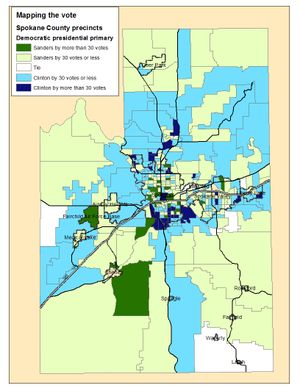Will Clinton’s primary victory count for much?
In terms of numbers, Hillary Clinton’s victory over Bernie Sanders in the Washington Presidential Primary was pretty decisive.
In terms of impact, it may be less so.
With 53 percent of the Democratic votes as of Wednesday evening, Clinton could point to the results to underscore her position as the Democratic frontrunner. But her campaign was not issuing victory statements and the Sanders campaign was ignoring the reversal from his showing in the March precinct caucuses, where he collected 72 percent of the support.
In part that could be because the Washington Democratic Party was refusing to comment on, or even recognize, the election in which more than 705,000 state voters were willing to say they were party members and cast ballots for Clinton or Sanders. Party officials would definitely not address the difference between the the primary and caucus results.
“The party did not use, participate or promote it,” state Democratic Party spokesman Jamal Raad said. It may consider the results in 2019, when it discusses its nominating process for the 2020 presidential election, an exercise it goes through every four years.
State Democratic Chairman Jaxon Ravens was happy to comment on the results of the Republican presidential primary, which has Donald Trump collecting about three of every four GOP ballots. Three other candidates on the ballot, all of whom had suspended their campaigns, split the remaining 25 percent. That’s a sign Washington Republicans are willing to embrace “Trump’s deeply offensive behavior,” he insisted. (Editor's note: An early version of this post incorrectly attributed Ravens comments to Raad.)
Asked why he could comment on the GOP results, but not the Democratic results, Raad said it was because Republicans were allocating their delegates on the vote.
Charla Neuman, a former congressional staffer who is now a principal at the Seattle area public affairs firm Neuman , didn’t find the difference between the caucuses results and the primary too surprising.
“The caucuses turn out a different type of voter, often more dedicated activists and less moderate,” Neuman said.
Both candidates campaigned in Washington before the caucuses, but neither campaign sent operatives to the state in search of primary votes because “no one felt they had anything to prove,” she said.
Caucuses tend to reward candidates like Sanders who can “galvanize support,” Todd Donovan, political science professor at Western Washington University. Primaries bring out a broader cross-section of voters.
“Thousands of Sanders people who attended the caucuses might not have voted in the primary because they knew it didn’t matter,” he added.
Travis Ridout, the Thomas S. Foley Distinguished Professor of Government and Public Policy at Washington State University, agreed the shift in support is partly due to the difference between people willing to attend caucuses and a larger number more comfortable with voting. There may also be a question of timing, with the primary coming late in May, when Clinton is closing in on the nomination.
“Maybe the pragmatists marked their ballots for Hillary Clinton,” Ridout said.
After Sanders’ strong showing in the caucuses, his supporters began demanding Washington’s super delegates – the top elected Democrats who are automatic delegates to the national convention –switch their allegiance from Clinton to Sanders. Super delegates are free to support the candidate of their choice, and so far none has announced a switch.
The primary results probably won’t silence the Sanders supporters, Neuman said, but it could provide some defense for super delegates backing Clinton.

